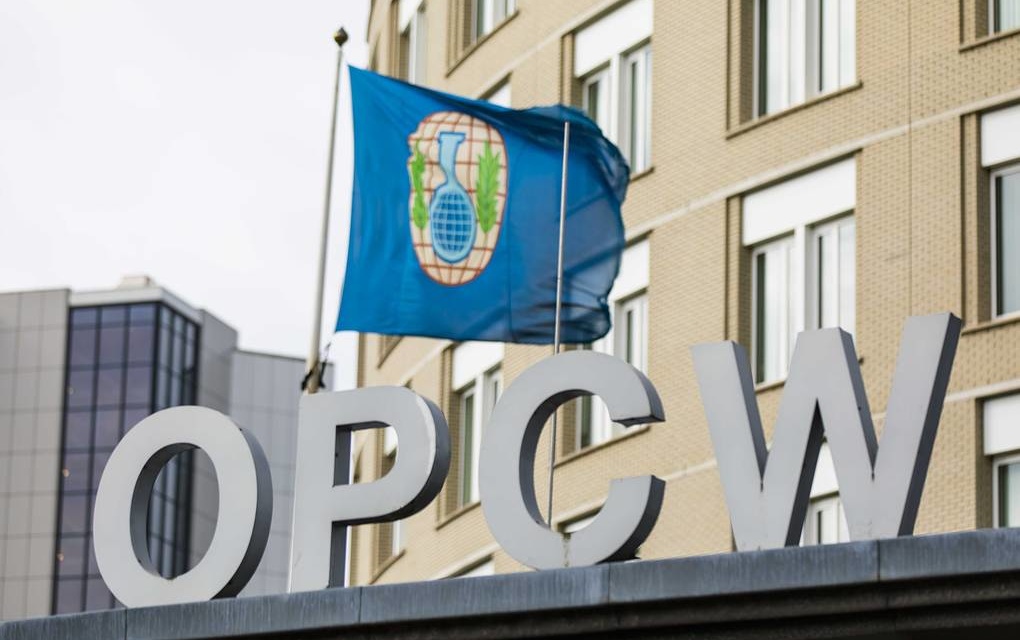The world’s chemical weapons watchdog has criticized Syria’s Assad regime for failing to declare a production facility and its lack of response to 18 other issues.
The Organization for the Prohibition of Chemical Weapons, which has found the regime responsible for sarin and chlorine attacks killing hundreds of civilians, issued the judgement on Friday.
OPCW Secretary-General Fernando Arias said that the regime’s chemical declaration has “gaps, inconsistencies, and discrepancies” and “still cannot be considered accurate and complete”.
He said that inspectors have gathered material and samples indicating “that production and/or weaponization of chemical warfare nerve agents took place” in a facility which was not listed. The OPCW has asked the Assad regime for a declaration of the exact types and quantities of chemical agents at the site, but there has been no response.
The Regime’s Deadly Attacks
The Assad regime joined the Chemical Weapons Convention in 2013, hoping to prevent an international response to its sarin attacks near Damascus which killed at least 1,400 people that August.
But it has withheld some stocks, including sarin used to kill about 90 people and injure hundreds in Khan Sheikhoun in northwest Syria in April 2017.
The Assad military has also used chlorine, which is not banned under the Convention, both in the northwest and near Damascus. Its attack on Douma, as a Russia-regime overran the East Ghouta region near the capital in April 2018, killed 43 people.
The OPCW formally found the regime responsible for the Khan Sheikhoun killings in October 2017, prompting Russia to veto the mandate for inspections that can assign blame.
However, the OPCW’s Conference of State Parties restored the mandate in June 2018. A Fact Finding Mission has concluded that there are “reasonable grounds” chlorine was used on Douma, and the Investigations Identification Team is currently completing its report on responsibility.
In April, another OPCW investigation concluded that the Assad military attacked the town of Latamineh in Hama Province with sarin and chlorine in March 2017, days before the Khan Sheikhoun killings.
Arias said in late October that the regime failed to meet a 90-day deadline, set in July, to declare the weapons used in the attacks on Latamineh and to disclose chemical stocks.
France, supported by more than 40 countries, is proposing that the OPCW suspend Syria’s “rights and privileges”, including voting rights. The organizzation’s 193 member states are expected to consider the proposal at their meeting in the spring.
Russia’s Propaganda Stunt
Russia, which has pursued a propaganda campaign for years to undermine the OPCW and protect the Assad regime, tried to bury Friday’s judgement with a misinformation ploy.
The Russian Ambassador to the UN, Vassily Nebenzia, broke protocol by trying to ask Arias a question in open rather than closed session.
Seeking to denigrate the OPCW inspections, Nebenzia used unsupported claims and misinformation from the “anti-imperialist” site The Grayzone, whose write Aaron Maté is being fed e-mails by an ex-OPCW staff member.
He accused the organization of being a pawn for countries who want to overthrow the Assad regime. Without presenting any evidence, he said the OPCW was pursuing an “anti-Syrian narrative despite all the discrepancies or counter evidence presented by Syria, Russia and independent experts”.
Throughout the OPCW’s investigations, Moscow has backed activists who support the Assad regime’s denial of chemical attacks.
See also Denying Syria’s Chemical Attacks, Attacking the Inspectors — The Douma Case
The UK Academics Helping Russia Deny Assad’s War Crimes
When Arias noted the protocol for questions and answers in a closed session, Russia’s officials claimed that this “proved that [Western countries] are ready to cover-up irregularities in OPCW at any price, even exposing themselves as cowards and liars”.
UK representative Thomas Phipps called out the propaganda stunt and pointed to Russia’s ongoing campaign against the OPCW and cover for the Assad regime’s chemical attacks.
..Russia carries out cyber attacks and an unrelenting disinformation campaign against the #OPCW; attempts to vilify humanitarian organisations while protecting a regime that has used CW against its own people; and refuses to account for the use of a banned CW on its territory 2/2
— Thomas Phipps🇬🇧🇺🇳 (@thomasphipps) December 11, 2020
Germany’s UN Ambassador Christoph Heusgen said Russia was “undermining the OPCW” but had failed because the organization remains strong and respected.
US Deputy Ambassador Richard Mills supported the OPCW’s “impartial and independent work” and urged “the Assad regime’s enablers, particularly Russia, to encourage Syria to come clear about its chemical weapons use and current chemical weapons stocks”.

